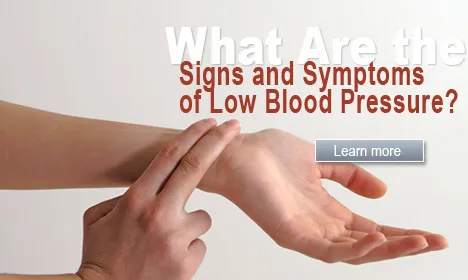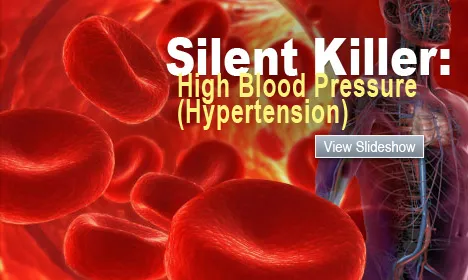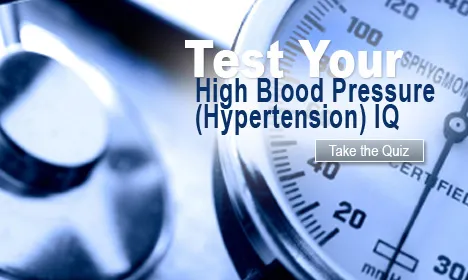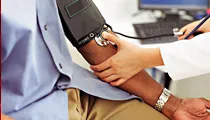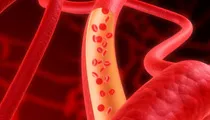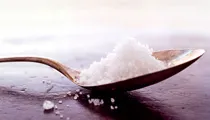Trending High Blood Pressure Topics
Low Blood Pressure
Low blood pressure, also referred to as hypotension, is blood pressure that is so low that it causes symptoms or signs due to the low flow of blood through the arteries and veins. Some of the symptoms of low blood pressure include light-headedness, dizziness, or even fainting.
High Blood Pressure Pictures Slideshow
Watch this slideshow on high blood pressure (hypertension). See inside the arteries and learn causes, symptoms, tests, treatments and remedies to stop this "silent killer."
High Blood Pressure (Hypertension) Quiz
Take this quiz and test your IQ of high blood pressure (hypertension), the cardiovascular disease that causes most strokes and heart attacks. How are dizziness, snoring, and gout related to HBP? Find the answer and learn how medical treatments and lifestyle adjustments fight this common problem.
High Blood Pressure
Learn about high blood pressure symptoms like headache, dizziness, shortness of breath, blurred vision and more. Causes, and normal blood pressure information is included.
Lowering BP Exercises
Watch this slideshow on exercises for lowering high blood pressure. Exercise and a healthy diet help prevent HBP and even boost the effectiveness of BP medication.
Salt Shockers
Surprise! Salty foods can be found in places you hadn't considered. And foods high in sodium are sometimes hard to avoid. Watch this slideshow to make smart, low-sodium choices.
Related Disease Conditions
 18 Ways to Lower Blood Pressure Without Medication
18 Ways to Lower Blood Pressure Without MedicationLifestyle changes and home remedies are effective in controlling high blood pressure (hypertension). Check out the center below for more medical references on hypertension, including multimedia (slideshows, images, and quizzes), related disease conditions, treatment and diagnosis, medications, and prevention or wellness.
 Can Blood Pressure Spike For No Reason?
Can Blood Pressure Spike For No Reason?It is normal for your blood pressure to rise and fall throughout the day. Your blood pressure can fluctuate at any time due to various reasons.
 Can High Blood Pressure (HBP) Cause Blood in Urine?
Can High Blood Pressure (HBP) Cause Blood in Urine?Blood in your urine is also known as hematuria. Very rarely, it is caused by high blood pressure (HBP) — also known as hypertension.
 Can You Be Physically Fit and Have High Blood Pressure?
Can You Be Physically Fit and Have High Blood Pressure?It is entirely possible and common for physically fit people to have high blood pressure (hypertension). Check out the center below for more medical references on high blood pressure, including multimedia (slideshows, images, and quizzes), related disease conditions, treatment and diagnosis, medications, and prevention or wellness.
 Can You Take Turmeric with Blood Pressure Medication?
Can You Take Turmeric with Blood Pressure Medication?Turmeric may not react well with some medications, including blood pressure medication.
 High Blood Pressure (Hypertension)
High Blood Pressure (Hypertension)High blood pressure (hypertension) occurs due to the tightening or stiffness of very small arteries called arterioles. As a result, the heart pumps harder through the stiff or narrow arterioles, leading to elevated pressure inside the vessels. Hypertension is known as 'the silent killer' because it often goes unnoticed and may cause serious complications such as kidney diseases, heart diseases, heart failure, and stroke.
 High Blood Pressure Treatment
High Blood Pressure TreatmentHigh blood pressure (hypertension) means high pressure (tension) in the arteries. Treatment for high blood pressure include lifestyle modifications (alcohol, smoking, coffee, salt, diet, exercise), drugs and medications such as ACE inhibitors, angiotensin receptor blockers, beta blockers, diuretics, calcium channel blockers (CCBs), alpha blockers, clonidine, minoxidil, and Exforge.
 How Can I Lower My Blood Pressure in 30 Seconds?
How Can I Lower My Blood Pressure in 30 Seconds?Blood pressure refers to the tension — or pressure — your blood places on the walls of your arteries as it passes through your body. Lower your BP in 30 seconds by practicing deep breathing, taking a warm shower, and meditating or reading.
 How Can I Lower My Blood Pressure in Minutes?
How Can I Lower My Blood Pressure in Minutes?Learn how to lower your high blood pressure quickly and fast in just minutes. Learn how to better manage high blood pressure.
 How Do I Know If I Have High or Low Blood Pressure Numbers?
How Do I Know If I Have High or Low Blood Pressure Numbers?High or low blood pressure can lead to serious health conditions. Learn more about what you should do if your pressure is outside the ideal range.
 How Do You Check Your Blood Pressure With Fingers?
How Do You Check Your Blood Pressure With Fingers?Most doctors recommend the use of a blood pressure machine to check blood pressure. An individual may check heart rate with their fingers, but not blood pressure.
 How Is Diastolic Hypertension Treated?
How Is Diastolic Hypertension Treated?Diastolic hypertension, where only your diastolic blood pressure is elevated, may be treated with lifestyle changes such as weight loss, reducing your sodium intake or alcohol consumption, and quitting smoking. Medications may be prescribed in more severe cases.
 How Long Can Caffeine Raise Your Blood Pressure?
How Long Can Caffeine Raise Your Blood Pressure?Peak blood pressure typically happens between one to two hours after caffeine intake, and this spike may last for over four hours.
 How Often Should Blood Pressure be Checked?
How Often Should Blood Pressure be Checked?People older than 40 years should check their blood pressure once a year, while those between 18 and 40 years old should check it every three to five years.
 How to Lower Blood Pressure Quickly
How to Lower Blood Pressure QuicklyIf you face any complications of high blood pressure such as a stroke or heart attack, contact your physician without any delay. Do not attempt home remedies in such grave situations. If you have high blood pressure, without any complications, the first thing to do is to calm down and lie flat.
 Hypertension-Induced Chronic Kidney Disease
Hypertension-Induced Chronic Kidney DiseaseHypertension-induced chronic kidney disease (CKD) is a long-standing kidney condition that develops over time due to persistent or uncontrolled high blood pressure (hypertension).
 Is 110/60 a Too Low Blood Pressure?
Is 110/60 a Too Low Blood Pressure?A blood pressure reading of 110/60 mmHg is usually not considered a low blood pressure.
 Is 150 Over 90 a Good Blood Pressure?
Is 150 Over 90 a Good Blood Pressure?Blood pressure of 150/90 mmHg comes under the category of stage I hypertension and means that you have high blood pressure.
 Is A Manual Blood Pressure More Accurate?
Is A Manual Blood Pressure More Accurate?Manual blood pressure gives accurate results when used correctly by a trained person. However, manual blood pressure measurement is not the recommended type of blood pressure monitoring for home use because it requires some training.
 Is It Okay to Take Blood Pressure Multiple Times?
Is It Okay to Take Blood Pressure Multiple Times?International hypertension societies recommend taking multiple blood pressure measurements over several days.
 Is Turmeric OK to Take With High Blood Pressure?
Is Turmeric OK to Take With High Blood Pressure?Turmeric is an ancient remedy, a perennial plant in the ginger family. Turmeric may help lower blood pressure, but talk to your doctor if you take medication to make sure it doesn't interact with it.
 Low Blood Pressure (Hypotension)
Low Blood Pressure (Hypotension)Low blood pressure (hypotension) is blood pressure that is so low that it causes low flow of blood through the arteries and veins. Some of the symptoms of low blood pressure include light-headedness, dizziness, and fainting if not enough blood is getting to the brain. Diseases and medications can also cause low blood pressure. When the flow of blood is too low to deliver enough oxygen and nutrients to vital organs such as the brain, heart, and kidneys; the organs do not function normally and may be permanently damaged.
 Portal Hypertension
Portal HypertensionPortal hypertension is most commonly caused by cirrhosis, a disease that results from scarring of the liver. Other causes of portal hypertension include blood clots in the portal vein, blockages of the veins that carry the blood from the liver to the heart, and a parasitic infection called schistosomiasis. Symptoms of portal hypertension include varices (enlarged veins), vomiting blood, blood in the stool, black and tarry stool, ascites (abnormal fluid collection within the peritoneum, the sac that contains the intestines within the abdominal cavity), confusion and lethargy, splenomegaly or enlargement of the spleen, and decreased white blood cell counts.
 Understanding Blood Pressure Chart Readings by Age
Understanding Blood Pressure Chart Readings by AgeBlood pressure is the force applied by the blood over the inner walls of the arteries. Although the average blood pressure for a person remains constant, it shows minor fluctuations throughout the day—declining while relaxing and momentarily increasing while being excited or under stress. An increase in resting blood pressure can scar, stiffen, or harden the arteries.
 What Are Abnormal Blood Pressure Number Ranges?
What Are Abnormal Blood Pressure Number Ranges?Abnormal blood pressure, especially high blood pressure, is a common issue with no initial symptoms. Learn how to keep your blood pressure in the normal range.
 What Are the 4 Stages of Hypertension?
What Are the 4 Stages of Hypertension?Learn the four stages of hypertension, which include normal, elevated blood pressure, stage I hypertension, and stage II hypertension.
 What Are the Best Fruits for Lowering Blood Pressure?
What Are the Best Fruits for Lowering Blood Pressure?The best fruits for lowering blood pressure include citrus fruits, berries, bananas, pomegranates, prunes, and melons.
 What Are the Top Drinks to Lower Blood Pressure?
What Are the Top Drinks to Lower Blood Pressure?The top drinks for lowering blood pressure include beverages that are rich in nutrients and low in sodium and fats. Learn the 10 best blood-pressure-lowering drinks here.
 What Does it Mean When the Bottom Number of Your Blood Pressure is Over 100?
What Does it Mean When the Bottom Number of Your Blood Pressure is Over 100?Diastolic blood pressure (DBP) is the pressure exerted on the walls of the arteries when the heart muscle relaxes between beats. When the bottom number of blood pressure (diastole) is over 100 mmHg, it may be called diastolic hypertension (DHT).
 What Does It Mean When the Diastolic Number is High?
What Does It Mean When the Diastolic Number is High?A high diastolic reading (equal to or greater than 120 mmHg) is linked to a higher risk of heart disease, abdominal aortic aneurysm, and other cardiovascular problems.
 What Foods Are Good If You Have Low Blood Pressure?
What Foods Are Good If You Have Low Blood Pressure?What is low blood pressure and what causes it? Learn the signs and symptoms of low blood pressure and what you can do to treat it.
 What Is Considered Stroke-Level High Blood Pressure?
What Is Considered Stroke-Level High Blood Pressure?Blood pressure readings above 180/120 mmHg are considered stroke-level and require immediate medical attention. Check out the center below for more medical references on hypertension, including multimedia (slideshows, images, and quizzes), related diseases, treatment, diagnosis, medications, and prevention or wellness.
 What Is High Blood Pressure (Hypertension)?
What Is High Blood Pressure (Hypertension)?High blood pressure or hypertension is when the blood pressure readings consistently range from 140 or higher for systolic or 90 or higher for diastolic. Blood pressure readings above 180/120 mmHg are dangerously high and require immediate medical attention.
 What Is Normal Blood Pressure and Pulse by Age?
What Is Normal Blood Pressure and Pulse by Age?The American Heart Association outlines that a normal blood pressure reading of 120/80 mm Hg for adults. Here is a chart that breaks down the ideal blood pressure range by age.
 What Is Normal Blood Pressure by Age?
What Is Normal Blood Pressure by Age?What is normal blood pressure? Learn about normal blood pressure by age and the risk factors of hypertension.
 What Is Normal Blood Pressure for a 60-Year-Old?
What Is Normal Blood Pressure for a 60-Year-Old?According to current guidelines from the American Heart Association, normal blood pressure for adults under the age of 65 is any blood pressure below 120/80 mmHg.
 What Is the Most Common Cause of Hypertensive Crisis?
What Is the Most Common Cause of Hypertensive Crisis?The most common cause of hypertensive crisis is a sudden increase in blood pressure in people with chronic hypertension, often caused by medical noncompliance.
 What Time of Day Is Blood Pressure Highest?
What Time of Day Is Blood Pressure Highest?Your blood pressure follows a pattern, rising a while before you wake up. It is the highest at midday and tends to drop in the evening or late afternoon.
 When Is Blood Pressure Lowest and Highest During the Day?
When Is Blood Pressure Lowest and Highest During the Day?Your blood pressure fluctuates throughout the day. Check your blood pressure twice a day at around the same time every day.
 When is the Best Time to Measure Your Blood Pressure?
When is the Best Time to Measure Your Blood Pressure?Hypertension, also known as high blood pressure, requires regular blood pressure checks. Measure your blood pressure at least twice a day at the same time every day.
 Which ACE Inhibitor Is the Best for Hypertension?
Which ACE Inhibitor Is the Best for Hypertension?The best ACE inhibitors for hypertension include Trandolapril, Enalapril, and Ramipril.
 Which Is More Important: Systolic or Diastolic Blood Pressure?
Which Is More Important: Systolic or Diastolic Blood Pressure?Systolic blood pressure is often given more attention as a risk factor for heart disease. However, both systolic and diastolic blood pressure are equally important in monitoring the health of your heart.
 Why Does Alcohol Cause Hypertension?
Why Does Alcohol Cause Hypertension?Alcoholic beverages are regular drinks in most parts of the world. No one knows how alcohol causes hypertension, but it may be due to the effects of alcohol endothelium, nervous system, cortisol levels or other body systems.
 Why is My Blood Pressure Suddenly High and Low?
Why is My Blood Pressure Suddenly High and Low?Blood pressure can be defined as the force your blood creates when it's flowing through your arteries. Blood pressure may be high or low due to medication side effects, certain medical conditions, or unknown reasons.
 Why Is My Bottom Blood Pressure Number High?
Why Is My Bottom Blood Pressure Number High?Isolated diastolic hypertension (IDH) occurs when your systolic blood pressure is normal, and only your diastolic blood pressure is high (over 80 mm Hg). Causes of high diastolic blood pressure include a high-sodium diet, obesity, lack of physical activity, excessive alcohol consumption, stress and anxiety.
Multimedia: Slideshows, Images & Quizzes
 High Blood Pressure (Hypertension) Quiz: Symptoms, Signs & Causes
High Blood Pressure (Hypertension) Quiz: Symptoms, Signs & CausesTake this quiz and test your IQ of high blood pressure (hypertension), the cardiovascular disease that causes most strokes and heart attacks. How are dizziness, snoring, and gout related to HBP? Find the answer and learn how medical treatments and lifestyle adjustments fight this common problem.
 How to Lower Blood Pressure: Exercise and Tips
How to Lower Blood Pressure: Exercise and TipsTrying to lower high blood pressure (hypertension)? Discover exercises good for lowering blood pressure, along with other lifestyle changes and medications to prevent high blood pressure.
 Hypertension: 15 Surprising Things That Raise Your Blood Pressure
Hypertension: 15 Surprising Things That Raise Your Blood PressureSalt, worry, and anger aren't the only things that can raise your blood pressure. Risk factors like loneliness and birth control may also affect blood pressure. See what else can bump your numbers up.
 Hypertension: Worst Foods for High Blood Pressure
Hypertension: Worst Foods for High Blood PressureDiagnosed with high blood pressure or trying to avoid it? Stay away from these foods.
 Low Blood Pressure (Hypotension): Symptoms, Signs, Causes
Low Blood Pressure (Hypotension): Symptoms, Signs, CausesWhat is low blood pressure (hypotension)? Explore low blood pressure causes, symptoms, and signs. Discover what is considered low blood pressure.
 Picture of Baroreceptors
Picture of BaroreceptorsThe body has mechanisms to alter or maintain blood pressure by specialized nerve cells called baroreceptors. See a picture of Baroreceptors and learn more about the health topic.
 Picture of Blood Pressure
Picture of Blood PressureThe blood pressure is the pressure of the blood within the arteries. See a picture of Blood Pressure and learn more about the health topic.
 Picture of Hypertension
Picture of HypertensionHigh blood pressure, defined as a repeatedly elevated blood pressure exceeding 140 over 90 mmHg -- a systolic pressure above 140 with a diastolic pressure above 90. See a picture of Hypertension and learn more about the health topic.
 Picture of Renal Artery Stenosis
Picture of Renal Artery StenosisNarrowing of the major artery that supplies blood to the kidney. See a picture of the Renal Artery Stenosis and learn more about the health topic.
 Salt & Low Sodium Diet Quiz
Salt & Low Sodium Diet QuizDo you love salt? Take the online Salt Quiz to get the facts about dietary salts and sodium in fruits, vegetables, processed foods, snacks and soups!
 Salt Shockers: Where High-Sodium Foods Lurk, and How to Avoid Them
Salt Shockers: Where High-Sodium Foods Lurk, and How to Avoid ThemSalty Foods can be everywhere. So how can you maintain a low-sodium diet and beware of the risks of high blood pressure which can lead to heart attack and stroke? Discover where high-sodium foods hide on supermarket shelves and restaurant menus. Learn to replace high-salt foods with better choices.
 What Is High Blood Pressure (Hypertension)? Symptoms, Treatments
What Is High Blood Pressure (Hypertension)? Symptoms, TreatmentsWhat causes high blood pressure (hypertension)? What is normal blood pressure? Know the warning signs and symptoms of high blood pressure. Read about high blood pressure medications, diet, and long-term treatments.
Treatment & Diagnosis
Medications & Supplements
- ACE Inhibitors
- amlodipine and valsartan (Exforge)
- amlodipine/atorvastatin - oral, Caduet
- Angiotensin II Receptor Blockers (ARBs)
- atenolol and chlorthalidone, Tenoretic
- Azor (amlodipine and olmesartan medoxomil)
- benazepril and hydrochlorothiazide (Lotensin HCT)
- benazepril/hydrochlorothiazide - oral, Lotensin HCT
- Benicar (olmesartan medoxomil)
- Benicar HCT (olmesartan medoxomil-hydrochlorothiazide)
- betaxolol, Kerlone (Discontinued Brand)
- bisoprolol (Zebeta)
- bisoprolol and hydrochlorothiazide (Ziac)
- bumetanide, Bumex (discontinued brand)
- candesartan cilexetil, Atacand
- captopril (Capoten)
- captopril and hydrochlorothiazide (Capozide)
- centaury
- chlorthalidone (Thalitone)
- clonidine
- Conjupri (levamlodipine)
- Consensi (amlodipine and celecoxib)
- Corlopam (fenoldopam mesylate) Injection
- doxazosin mesylate (Cardura)
- enalapril (Vasotec, Epaned)
- enalapril and hydrochlorothiazide (Vaseretic)
- felodipine (Plendil)
- furosemide
- hydralazine (Apresoline)
- hydrochlorothiazide
- indapamide, Lozol (Discontinued)
- irbesartan (Avapro)
- labetalol
- Letairis (ambrisentan)
- lisinopril and hydrochlorothiazide (Zestoretic, Prinzide)
- losartan
- losartan and hydrochlorothiazide (Hyzaar)
- Lotrel (amlodipine and benazepril)
- methyldopa (Aldomet)
- metolazone (Zaroxolyn)
- midodrine
- nebivolol
- nicardipine, Cardene, Cardene SR
- nisoldipine (Sular)
- prazosin (Minipress)
- Prestalia (perindopril arginine and amlodipine)
- reserpine
- Sectral (acebutolol)
- Side Effects of Accupril (quinapril)
- Side Effects of Aldomet (methyldopa)
- Side Effects of Altace (ramipril)
- Side Effects of Apresoline (hydralazine)
- Side Effects of Atacand (candesartan)
- Side Effects of Avapro (irbesartan)
- Side Effects of Benicar (olmesartan medoxomil)
- Side Effects of Benicar HCT (olmesartan medoxomil-hydrochlorothiazide)
- Side Effects of Capoten (captopril)
- Side Effects of Capozide (captopril and hydrochlorothiazide/HCTZ)
- Side Effects of Cardizem (diltiazem)
- Side Effects of Cardura (doxazosin)
- Side Effects of Catapres (clonidine)
- Side Effects of Coreg (carvedilol)
- Side Effects of Cozaar (losartan)
- Side Effects of Diovan (valsartan)
- Side Effects of Dyazide (triamterene and hydrochlorothiazide)
- Side Effects of Exforge (amlodipine and valsartan)
- Side Effects of Hyzaar (losartan and hydrochlorothiazide)
- Side Effects of Inderal (propranolol)
- Side Effects of Lopressor (metoprolol)
- Side Effects of Lotensin (benazepril)
- Side Effects of Lotrel (amlodipine and benazepril)
- Side Effects of Lozol (indapamide)
- Side Effects of Mavik (trandolapril)
- Side Effects of Micardis (telmisartan)
- Side Effects of Microzide (hydrochlorothiazide)
- Side Effects of Minipress (prazosin)
- Side Effects of Monopril (fosinopril)
- Side Effects of Pletal (cilostazol)
- Side Effects of Sular (nisoldipine)
- Side Effects of Tenex (guanfacine)
- Side Effects of Thalitone (chlorthalidone)
- Side Effects of Trandate (labetalol)
- Side Effects of Vaseretic (enalapril/hydrochlorothiazide)
- Side Effects of Vasotec (enalapril)
- Side Effects of Zaroxolyn (metolazone)
- Side Effects of Zestoretic (lisinopril and hydrochlorothiazide)
- Side Effects of Zestril (lisinopril)
- spironolactone/hydrochlorothiazide
- Tekturna HCT (hydrochlorothiazide and aliskiren)
- telmisartan, Micardis
- Thiazides (Diuretics)
- trandolapril (Mavik)
- trandolapril/verapamil extended-release - oral, Tarka
- triamterene and hydrochlorothiazide
- Tribenzor (olmesartan medoxomil, amlodipine, hydrochlorothiazide)
- valsartan, Diovan
- Ziac (bisoprolol and hydrochlorothiazide) Side Effects, Warnings, and Drug Interactions
